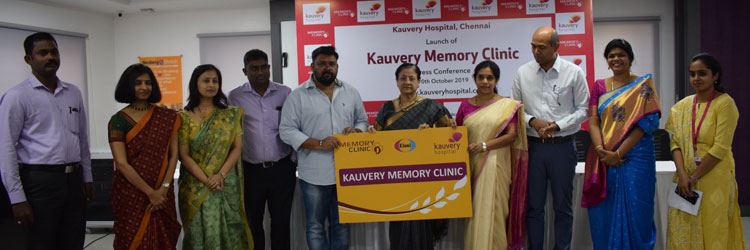
Chennai’s first hospital based “MEMORY CLINIC” launched at Kauvery Hospital
The Memory clinic will operate from Monday to Saturday at the Kauvery hospital, Alwarpet between 3-5 pm.
People may need this service if they are:
– Having difficulty remembering day-to-day things.
– Starting to forget dates and appointments.
– Getting in a muddle with finances, paying bills etc.
– Finding that they are losing things around the house.
– Finding it harder to remember names.
– Having difficulty following conversations.
– Carer is having difficulty coping.
Any of these difficulties may result in anxiety, frustration, anger, high levels of stress and a feeling of isolation. The teams are there to help patients and care takers to manage these feelings.
Cognitive deficits in Dementia Syndrome
The DSM-IV codes are used by mental health professionals to describe the features of a given mental disorder and indicate how the disorder can be distinguished from other, similar problems.
The DSM – IV criteria for definition of the dementia syndrome are multiple cognitive deficits, including memory impairment and at least one of the following:
- Aphasia – problems with both expressive and receptive language
- Apraxia – inability to carry our purposeful movements even though there is no motor or sensory impairment
- Agnosia – failure to recognise, especially people
- Decreased need for sleep
Additionally the cognitive deficits are severe enough to interfere with occupational and/or social functioning, and represent decline from previously higher function.
The memory Screen Test
The first step for identification is a Memory Screen. A combination of tests are used for these and when a deficit is identified further evaluation with in depth testing by a psychologist and assessment by a neurologist or psychiatrist is necessary.
Laboratory investigations include:
- Thyroid profile
- Renal profile
- Liver function tests
- Lipid profile
- B12 and folic acid levels
- Serum calcium, Vitamin D3
- HIV and VDRL
Advanced investigations include:
- Complete neurological examination
- Detailed neuropsychological evaluation
- Screening for neuropsychiatric comorbidities like depression, anxiety
- ApoE 4 levels if available
- EEG, Lumbar puncture are useful to exclude dementia due to Jakob Creutzfeldt disease
- MRI + MRA of the brain helps diagnose Vascular Dementia, Alzheimer’sDementia, Frontotemporal Dementia, and other causes of cognitive dysfunction like Normal Pressure Hydrocephalus, Chronic subdural haematoma, slow growing brain tumours like Meningiomas, etc
- The FDG PET scan of the brain can be diagnostic with specific deficits in Alzheimer’s disease and helps confirm the diagnosis. In comparison with CT, MRI and SPECT, PET is expensive, seldom accessible and time consuming. Consequently, PET is not routinely used in the diagnostic workup for Alzheimer’s disease (AD). However, PET images may provide useful differential diagnostic information, such as parietal lobe changes in AD, when CT and MRI scans fail to provide sufficient information.
The advantage of early detection
Early detection has several advantages even though some Dementias have no treatment
– Risk factors like hypertension,diabetes, smoking, alcohol intake, head injuries etc can be managed
– Planning of the personal affairs of the individual whose cognition is failing can be done
– Arranging the timing and extent of help needed when the individual progressed from independence to dependence can be planned
– Coping strategies for potential problems can be learnt
– Some drugs available for treatment slow down progression and reduce extent of impairment

Dr.Prithika Chary
Senior Consultant Neurologist & Neurosurgeon & Chief Neurologist
Kauvery Hospital

